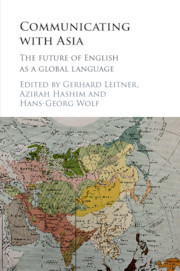Description
Communicating with Asia
The Future of English as a Global Language
Coordinators: Leitner Gerhard, Hashim Azirah, Wolf Hans-Georg
Communicating with Asia is essential in today's global world. This volume explores Asia from both a communicative and linguistic perspective.
Language: English
Subject for Communicating with Asia:
Communicating with Asia
Publication date: 03-2019
Support: Print on demand
Publication date: 03-2019
Support: Print on demand
Communicating with Asia
Publication date: 01-2016
Support: Print on demand
Publication date: 01-2016
Support: Print on demand
Description
/li>Contents
/li>Biography
/li>
Communicating with Asia brings together an international team of leading researchers to discuss South, South-East, East and Central Asia, and explore Mandarin, Cantonese, Hindi-Urdu, Malay, and Russian as major languages. The volume locates English inside a number of national, regional or lingua franca contexts and illustrates the way it develops in such contact situations. Local dynamics affecting languages in contact and cultural links of languages are dealt with, such as educational-political issues and tensions between conflicting norms. In today's global world, where the continent is an increasing area of focus, it is vital to explore what it means to 'understand' Asian cultures through English and other languages. This important new study will be of interest to students and researchers working in the fields of regional studies, English as a global language, Asian languages and cultural studies.
Communicating with Asia: introduction Gerhard Leitner, Azirah Hashim and Hans-Georg Wolf; Part I. English in Selected Regional and National Habitats with a Glance at the Role of Outward-Bound Communication Needs: 1. The development of English in Pakistan Tariq Rahman; 2. English for Japan: in the cultural context of the East-Asian expanding circle Nobuyuki Hino; 3. Convergence and divergence of English in Malaysia and Singapore Ee-Ling Low and Rachel Tan Siew Kuang; 4. Indian English prosody Pramod Pandey; 5. Charting the endonormative stabilization of Singapore English Tan Siew Imm; 6. Arabic in contact with English and Malay in Malaysia Azirah Hashim and Gerhard Leitner; 7. Preposition stranding and pied-piping in Philippine English: a corpus-based study Danilo T. Dayag; 8. The Americanization of the phonology of Asian Englishes: evidence from Singapore Ying-Ying Tan; 9. Postcolonial and learner Englishes in Southeast Asia: implications for international communication Michael Percillier; Part II. Major Other Languages in Asia, their International Status and Impact on Education: 10. Multilingualism, Hindi-Urdu and Indian English: intra-national and international diaspora Tej K. Bhatia and William C. Ritchie; 11. Bahasa Indonesia and Bahasa Melayu: convergence and divergence of the official languages in contemporary Southeast Asia Lim Beng Soon and Gloria Poedjosoedarmo R.; 12. Putonghua and Cantonese in the Chinese territories Chan Shui-Duen; 13. The Chinese language in the Asian diaspora: a Malaysian experience Wang Xiaomei; 14. Russian in Far East Asia: linguistic policies on the periphery of empire Roxana Doncu; 15. Russian and Turkic languages in Central Asia Zoya Proshina; Part III. Wider Perspectives: 16. Understanding Asia by means of cognitive sociolinguistics and cultural linguistics – the example of ghosts in Hong Kong English Hans-Georg Wolf and Thomas Chan; 17. Understanding Asia through English literature Gerhard Stilz; 18. English as a lingua franca and educational impact in Asia Andy Kirkpatrick; 19. The Australian Asia project Joseph Lo Bianco and Yvette Slaughter.
Gerhard Leitner, Professor of English, has taught varieties of English and English as a global language in Berlin, and as visiting professor in Australia, Malaysia, Singapore, China, India and Italy.
Azirah Hashim is a Professor of English at the University of Malaya, Kuala Lumpur, where she is also Dean of the Humanities Research Cluster and Director of the Centre for ASEAN Regionalism.
Hans-Georg Wolf is Chair Professor for the Development and Variation of the English Language at Universität Potsdam, Germany.
Azirah Hashim is a Professor of English at the University of Malaya, Kuala Lumpur, where she is also Dean of the Humanities Research Cluster and Director of the Centre for ASEAN Regionalism.
Hans-Georg Wolf is Chair Professor for the Development and Variation of the English Language at Universität Potsdam, Germany.
© 2024 LAVOISIER S.A.S.



